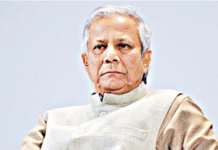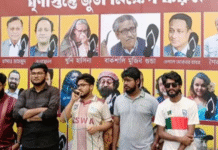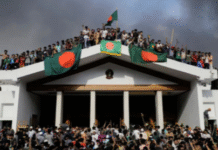More than 100 suspected Rohingya migrants from Myanmar and Bangladesh have been found in Thailand’s southern Songkhla province, police said on Friday.
Police said the 111 migrants had been left alone in the jungle after suspected human traffickers who had brought them into the country fled.
‘They were found on a mountain and, from our initial investigation, the people who brought them fled so they were wandering alone,’ police lieutenant colonel Somkiat Ostaphun, deputy superintendent of Rattaphum police station, told Reuters.
Meanwhile, Thai prime minister Prayuth Chan-ocha on Friday called for a three-way meeting with neighbours Malaysia and Myanmar to try to resolve a regional human trafficking crisis following the discovery of a mass grave in the country’s far south.
‘I have ordered the ministry of foreign affairs to liaise with Malaysia and Myanmar to hold a meeting to resolve this,’ Prayuth told reporters. ‘We think this meeting can be held by the end of this month.’
Earlier on Friday, police General Aek Angsananont, deputy commissioner-general of the Royal Thai Police, said eight people had been arrested,
including seven Thais and a Myanmar national, suspected of having links to human trafficking networks.
A ‘top figure’ in a regional trafficking network had been arrested, police added, without providing details.
An estimated 25,000 Rohingya Muslims and Bangladeshis boarded people-smugglers’ boats in the first three months of the year, double the number a year earlier, the UN refugee agency UNHCR said on Friday.
The migrants brave perilous journeys to escape religious and ethnic persecution and poverty. The UNHCR estimated that 300 people died at sea in the first quarter of 2015 due to starvation, dehydration and abuse by boat crews.
They are often trafficked through Thailand, a predominantly Buddhist country, and taken into the country’s jungles, where traffickers demand ransom to release them or smuggle them across the border to mainly Muslim Malaysia.
In his weekly televised speech to the nation late on Friday, Prayuth acknowledged the complicity of officials in the lucrative human smuggling trade, and vowed to stamp it out.
‘The whole system will be overhauled … individuals involved will be brought to justice,’ Prayuth said.
Myanmar’s permanent secretary at the ministry of immigration, Myint Kyaing, said Myanmar had not yet been contacted about the meeting.
‘I think we would be interested to take part in that meeting if they officially invited us,’ said Win Naing Tun, chief of Myanmar’s anti-human trafficking police.
Malaysia’s foreign ministry spokesman had no immediate comment when contacted by Reuters.
The United States, which has censured Thailand for failing to act against human trafficking, called on Monday for a speedy and credible inquiry into the discovery of the mass grave.
In the mean time, a crackdown on human trafficking networks in Thailand is putting migrants fleeing Myanmar and Bangladesh at more risk as smugglers hold their captives for longer at sea and hide deeper in the jungle, say activists and officials.
Activists and officials say the ongoing crackdown is having an unintended effect: traffickers are taking greater risks to avoid being caught.
The results are conditions of increasing desperation.
‘We’ve been ordered to carry out (a crackdown), and, yes, I admit there may have been some effects,’ police colonel Anuchon Chamat, deputy commander of police in the southern province of Nakhon Si Thammarat, told Reuters.
‘Before, the ships would wait for people in Myanmar, and once they were full, would rush over and in four or five days be in Thai waters. But not anymore,’ he said.
Police said the 111 migrants had been left alone in the jungle after suspected human traffickers who had brought them into the country fled.
‘They were found on a mountain and, from our initial investigation, the people who brought them fled so they were wandering alone,’ police lieutenant colonel Somkiat Ostaphun, deputy superintendent of Rattaphum police station, told Reuters.
Meanwhile, Thai prime minister Prayuth Chan-ocha on Friday called for a three-way meeting with neighbours Malaysia and Myanmar to try to resolve a regional human trafficking crisis following the discovery of a mass grave in the country’s far south.
‘I have ordered the ministry of foreign affairs to liaise with Malaysia and Myanmar to hold a meeting to resolve this,’ Prayuth told reporters. ‘We think this meeting can be held by the end of this month.’
Earlier on Friday, police General Aek Angsananont, deputy commissioner-general of the Royal Thai Police, said eight people had been arrested,
including seven Thais and a Myanmar national, suspected of having links to human trafficking networks.
A ‘top figure’ in a regional trafficking network had been arrested, police added, without providing details.
An estimated 25,000 Rohingya Muslims and Bangladeshis boarded people-smugglers’ boats in the first three months of the year, double the number a year earlier, the UN refugee agency UNHCR said on Friday.
The migrants brave perilous journeys to escape religious and ethnic persecution and poverty. The UNHCR estimated that 300 people died at sea in the first quarter of 2015 due to starvation, dehydration and abuse by boat crews.
They are often trafficked through Thailand, a predominantly Buddhist country, and taken into the country’s jungles, where traffickers demand ransom to release them or smuggle them across the border to mainly Muslim Malaysia.
In his weekly televised speech to the nation late on Friday, Prayuth acknowledged the complicity of officials in the lucrative human smuggling trade, and vowed to stamp it out.
‘The whole system will be overhauled … individuals involved will be brought to justice,’ Prayuth said.
Myanmar’s permanent secretary at the ministry of immigration, Myint Kyaing, said Myanmar had not yet been contacted about the meeting.
‘I think we would be interested to take part in that meeting if they officially invited us,’ said Win Naing Tun, chief of Myanmar’s anti-human trafficking police.
Malaysia’s foreign ministry spokesman had no immediate comment when contacted by Reuters.
The United States, which has censured Thailand for failing to act against human trafficking, called on Monday for a speedy and credible inquiry into the discovery of the mass grave.
In the mean time, a crackdown on human trafficking networks in Thailand is putting migrants fleeing Myanmar and Bangladesh at more risk as smugglers hold their captives for longer at sea and hide deeper in the jungle, say activists and officials.
Activists and officials say the ongoing crackdown is having an unintended effect: traffickers are taking greater risks to avoid being caught.
The results are conditions of increasing desperation.
‘We’ve been ordered to carry out (a crackdown), and, yes, I admit there may have been some effects,’ police colonel Anuchon Chamat, deputy commander of police in the southern province of Nakhon Si Thammarat, told Reuters.
‘Before, the ships would wait for people in Myanmar, and once they were full, would rush over and in four or five days be in Thai waters. But not anymore,’ he said.
Source: New Age










